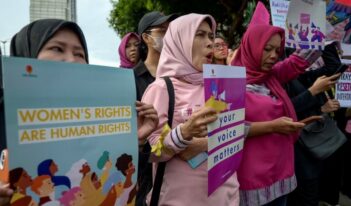
Even after Bostock, the state legislature needs to pass the Pennsylvania Fairness Act.
In Pennsylvania, local governments were the first to respond to discrimination against LGBTQ+ people, enacting ordinances that explicitly provided LGBTQ+-inclusive protections that federal and state anti-discrimination laws did not.
Recent developments in the law, culminating in the U.S. Supreme Court’s decision in Bostock v. Clayton County, make it clear that discrimination “because of sex” necessarily includes sexual orientation and gender identity under Title VII of the Civil Rights Act of 1964.
Still, the need remains to codify clear LGBTQ+ protections at all levels of government. On the federal level, Congress must pass the Equality Act. In Pennsylvania, instead of threatening to remove local protections, the General Assembly must pass the Pennsylvania Fairness Act, which would amend the Pennsylvania Human Relations Act (PHRA) to prohibit explicitly discrimination on the basis of sexual orientation, gender identity, or gender expression in employment, housing, and public accommodations.
As of January 2021, at least 69 Pennsylvania municipalities have added LGBTQ+-inclusive protections to their ordinances. In Philadelphia, the Fair Practices Ordinance has explicitly prohibited discrimination on the basis of sexual orientation since 1982 and on gender identity since 2002. In Pittsburgh, local law has explicitly prohibited discrimination on the basis of sexual orientation since 1992 and gender identity and expression since 2014.
Furthermore, the Pennsylvania Human Relations Commission––the agency tasked with enforcing the PHRA––issued guidance in 2018 interpreting state law as prohibiting “discrimination on the basis of sex assigned at birth, sexual orientation, transgender identity, gender transition, gender identity, and gender expression.” This interpretation of state law was consistent with developing pre-Bostock case law and with the Equal Employment Opportunity Commission’s decisions and guidance clarifying that a discrimination claim based on sexual orientation or gender identity is discrimination on the basis of sex under Title VII.
Despite these developments, the proposed Pennsylvania Fairness Act, which would codify clear LGBTQ+ protections, has languished in the General Assembly without even a vote. On the federal level, the Equality Act, which would explicitly add “sexual orientation and gender identity” to existing civil rights laws, is closer to becoming law as it has already passed in the U.S. House of Representatives.
It is time for both of these bills to become law.
The common-sense clarification of Title VII in Bostock does not obviate the need for amendments to anti-discrimination laws that would enumerate sexual orientation, gender identity, and gender expression as protected classifications. As important as Bostock is, its long-term impact depends on the willingness of future courts to apply it.
In other contexts, courts have chipped away at and threatened to overturn widely popular and long-standing precedent such as Roe v. Wade due to ideological beliefs, and the same could occur with Bostock. Clear codification of LGBTQ+ protections would reduce the likelihood that current antidiscrimination protections follow a trajectory similar to that of protections for abortion rights.
In Pennsylvania, clear codification of LGBTQ+ protections may also safeguard against the threat of pending legislation that would terminate workplace protections at the local level and block avenues for redress at local commissions. One pending bill would, for example, prohibit a municipality from “regulating employer policies or practices or enforcing any mandate regarding employer policies or practices.” If passed, the law would be retroactive, preempting local ordinances, rules, or policies enacted on or before January 1, 2015.
The likely purpose of this local preemption bill, based on its retroactivity date and testimony from a previous session, is to take away paid sick days from people who work in Philadelphia and Pittsburgh and to remove predictable work scheduling from those who are employed in Philadelphia. The bill, however, also threatens a wide range of local workplace protections, including LGBTQ+ protections passed after January 1, 2015.
The current version of the local preemption bill would exempt ordinances “authorized” by the PHRA. To the extent there is any ambiguity about whether the PHRA authorizes local ordinances that include specifically enumerated classifications that the PHRA does not, amending the state law to make it explicitly LGBTQ+-inclusive would reduce the likelihood that a challenge based on any preemption language would succeed.
Enacting the Pennsylvania Fairness Act and the Equality Act would also send a clear and important message that Pennsylvania and the United States are committed to supporting the rights of LGBTQ+ people.
Far too many LGBTQ+ individuals have fallen through the gaps in the patchwork of existing protections. Discrimination against LGBTQ+ people remains rampant, particularly for individuals who are navigating intersecting forms of oppression, including racism, sexism, classism, and xenophobia. For example, LGBTQ+ workers of color face multiple barriers that force them out of the workforce at disproportionately high rates, and transgender people are almost four times as likely to have a household income of less than $10,000 compared to the general population.
The spate of bills that state legislators across the country have introduced to target transgender people’s access to necessities such as education and health care also demonstrates the need to strengthen LGBTQ+ protections in statutory law. In Pennsylvania, some legislators are actually attempting to codify discrimination against transgender children with a bill that would prohibit transgender girls and women from “athletic teams or sports designated for females, women, or girls.” This bill perpetuates sex-based stereotypes, threatens the health and well-being of transgender and gender-nonconforming youth, promotes an unproven claim that transgender students are stealing athletic opportunities from cisgender students, and would entrench discrimination in the law.
Legislators opposing these efforts must send the opposite message—that LGBTQ+ people have the right to live full lives free from harassment, violence, and discrimination.
This message of equality is at the heart of Bostock, the Equality Act, and the Pennsylvania Fairness Act. In Pennsylvania, instead of reducing municipal power or passing bills that harm transgender people and help no one, the General Assembly should follow the lead of municipalities across the Commonwealth by codifying LGBTQ+-inclusive protections in state law.
This essay is part of a 9-part series, entitled LGBTQ+ Rights and Regulation.




